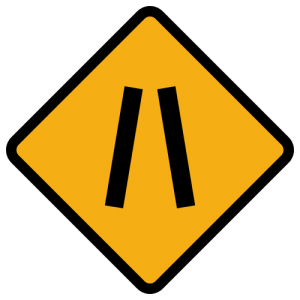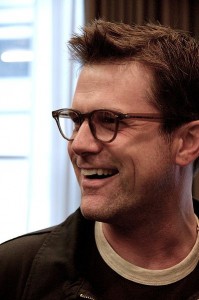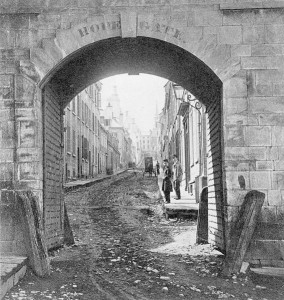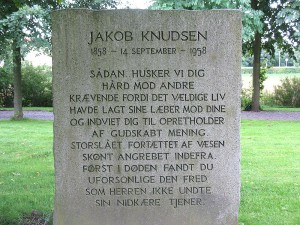 The article “Litterære manifester for et nyt årti” in the Danish newspaper Informationen gives 9 manifestos of contemporary Danish writers containing their thoughts about literature in the new decennia that we just entered. As always the thoughts are personal and thereby very different from each other. Some don’t believe in manifestos while others write a nice little article with their thoughts. One subject that is more often mentioned is the difference between the popular detective stories and the less commercial literary works. Most hope that the latter will survive the stream of very well marketed, and occasionally well written detective stories. This cry for support for the original, more personal literary works make it clear that the writers see a clear difference in value between the two kind of books. The literary works might not make the writer a lot of money (and maybe if they do than only after the writer’s death) but they do contribute to the more interesting and valuable part of literature. (Thanks to Ian)
The article “Litterære manifester for et nyt årti” in the Danish newspaper Informationen gives 9 manifestos of contemporary Danish writers containing their thoughts about literature in the new decennia that we just entered. As always the thoughts are personal and thereby very different from each other. Some don’t believe in manifestos while others write a nice little article with their thoughts. One subject that is more often mentioned is the difference between the popular detective stories and the less commercial literary works. Most hope that the latter will survive the stream of very well marketed, and occasionally well written detective stories. This cry for support for the original, more personal literary works make it clear that the writers see a clear difference in value between the two kind of books. The literary works might not make the writer a lot of money (and maybe if they do than only after the writer’s death) but they do contribute to the more interesting and valuable part of literature. (Thanks to Ian)
Kategori: English
-
Informationens 9 manifestos
-
Life should be obvious
 This thought was somewhere in between my notes. It is from not too long ago, but I actually can’t remember where I got the inspiration from. It must have been a blogpost somewhere.
This thought was somewhere in between my notes. It is from not too long ago, but I actually can’t remember where I got the inspiration from. It must have been a blogpost somewhere.Life has to be a selvfølge (something obvious, literally: following its self), one does things because one has to. Because it is needed to survive or because one can’t stop doing it anyway. Any other thing will cost too much energy and will be experienced as something that doesn’t really matter. Accepting this also means accepting ones role in life. One can’t become more than one is, but one should continue looking at, training and exploring ones self. A whole world lies inside. Many things become obvious when one discovers the beauty of living and being.
I’ll try to follow the advice. Distraction comes o so easy, all things seems to be interesting, worthwhile or even important. But deep inside of us our soul (or whatever it is) only asks for certain things. To be truly productive and valuable to yourself means concentrating on this voice.
As I added to the thought (probably sarcastically – but that can’t cover up the well meant intention): Good luck!
-
Merlin Mann: Figure out who you are
 This post from 43folders.com contains a video with another interesting line of thoughts by Merlin Mann, who thinks about productivity, creativity and the caveats surrounding them.
This post from 43folders.com contains a video with another interesting line of thoughts by Merlin Mann, who thinks about productivity, creativity and the caveats surrounding them.Merlin presents his ideas in a popular way, fast and often funny, but he is serious and dedicated in trying to find out the truth about his subjects.
It is another attempt to define, and thereby better deal with, procrastination.
Here are some quotes I wrote down:
Procrastination happens when we don’t know what to do.
(You go look around to find out what you should do next.)
Sometimes you procrastinate because you feel you need to do something else for a while. But if so, then never forget who you are and what you want.
It’s important for creativity to read or do something even if you don’t know why you are doing it.
But sometimes you have to put your head down and work really hard.Happiness is in the right balance of these two.
In his video Merlin explains that it is important to figure out who you are and to always keep that in mind. Procrastination can be o.k., but it should never lead you away from your own goal.
There are truly many more thoughts in the video including his well meant advice on how to protect yourself from certain forms of procrastination.
—–
Here’s another post I wrote about Merlin Mann’s ideas.
-
How to be prudent in Dutch.
Hope Gate, Québec ca. 1871, by Louis-Prudent Vallée
There are many languages, many words. All spoken languages are prefect because they have been used for centuries.
But sometimes there is a word in a language that seems to be unknown in other languages.
I looked up the word prudent, as I didn’t know exactly how to define it.According to thefreedictionary.com it is:
prudent
adj.1. Wise in handling practical matters; exercising good judgment (sic) or common sense.
2. Careful in regard to one’s own interests; provident.
3. Careful about one’s conduct; circumspect.There is a possibility at the bottom of the page to translate the word into another language. This can be helpful for those that speak a different native language.
But prudent is translated into Dutch as voorzichtig. That is definitely not right. Voorzichtig means careful, and this not in the sense mentioned in point 1, 2 or 3 above.There is apparently no good translation of prudent. That’s probably why I didn’t really know it. It makes one wonder why the Dutch didn’t need a word covering this quality.
—-
P.S. I came to think of the word verstandig as a somewhat better translation. And indeed after a quick search I found that http://www.freedict.com/onldict/onldict.php chooses verstandig as the best option.
But http://online.ectaco.co.uk gives many options: voorzichtig, omzichtig, beleidvol, oordeelkundig, verstandig.
-
One Channel
 Imagine a man or a woman who owns the best and most modern television money can buy. A fancy wide screen with surround system sounds.. whatever…
Imagine a man or a woman who owns the best and most modern television money can buy. A fancy wide screen with surround system sounds.. whatever…Now think that this person watches only one channel, say the first channel that appeared when the television was turned on the first time. A life long, one channel….
We wouldn’t do that of course. We would quickly get curious and have a look at the other channels..
What about our lives, are we aware that we have a huge influence upon the life we lead?
We can believe something, or we can believe something else.
It might demand some effort, but we have the possibility to think for ourselves, let our curiosity flow.
Or we can choose to watch only one channel.
-

Lærer Urup, by Jakob Knudsen
Lærer Urup (1906) Jakob Knudsen
Edition: Gyldendal 1949
Language: Danish
Picture: Rødding: mindetavle for Jakob Knudsen – by Hubertus45 via Wikipedia.
The stone on the picture can be found on the grounds of Rødding Højskole. It bears a text referring to Jakob Knudsen as his father was a teacher on this school and Jakob therefore born there.
When I came across it on the internet I had never heard of Jakob Knudsen but the text on the stone made me curious. I read more about him on the “Arkiv for Dansk Litteratur” and a few days later I bought “Lærer Urup” in a second hand bookshop.
The main character of the book, Lærer Urup, (“lærer” means teacher) is supposed to, more or less, mirror the views of the writer himself. Jakob Knudsen had some clear points that he wanted to make, and the book therefore has a clear theme right from the start. Not much time is waisted to explaining his theories with the help of examples interwoven into a storyline.
To make it all digestible the book is written in a popular tone in a daily language, dialogues even written in several dialects.
The story is about a teacher and his controversial theories about religion, society and education. These theories bring him into conflict with a. o. the local priest of the village where Lærer Urup is starting out as a teacher, and the discussions between these two gives the writer plenty of opportunity to explain his views. Soon after his appointment the teacher gets criticised from different directions but he stays firm and true to his believes which result in complications that form the main elements of the storyline of the novel.
The novel is interesting, it has its main strengths in the opinions and views of the main character. The story itself is not too well written in my opinion, some parts seem to be realistic and truthfully descriptive, other scenes are more theoretical and give a rather black and white description of characters and situations. I felt that too much was happening and as if that was done to attract a wider audience.
Lærer Urups views are interesting however, and his bold statements make them very clear.
“Jeg troer, at alt, hvad der kommer umiddelbart fra Gud til os – Naturens Verden tænker jeg ikke paa – det er Lys, Sandhed, Glæde, Frihed, Kjærlighed; alt hvad der hedder Straf, Strænghed, Lov, Tvang, Frygt – det hører Naturen og Menneskeverden til, men dér er det ogsaa fuldkommen nødvendigt, hvis vi Mennesker ikke skal raadne op i vor egen Elendighed, – ogsaa for at vi skal faa Trang til Gud. Det er Tidens Slaphed, den sjaskede Blødagtighed og Kraftesløshed, der volder, at den er ugudelig.”
Lærer Urup, page 39.
His religious views are based upon the idea that it is up to humanity to make life on earth bearable. God is light, truth, joy, freedom and love and he created the earth and its nature. But it is up to the humans to create a society and make it work. Strict rules are necessary, punishment and even force as well.
“Aa ja, Moralen er ikke saa højtidelig i sin Begyndelse, som man troer. Tager man Angsten bort, saa forsvinder mindst Halvdelen af Moralen med det samme.”
Lærer Urup, page 17.
It is on the other hand important for Lærer Urup that people can make up their own mind and that they should not be forced to think or believe what society tells them. Physical and spiritual freedom are two opposites for him.
His criticism upon society, written in 1906, can still be used for contemporary society, it might as well become popular again soon. The book discusses subjects that will probably never be out-dated.

